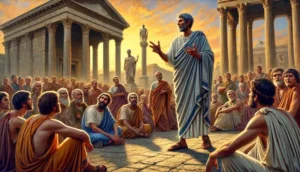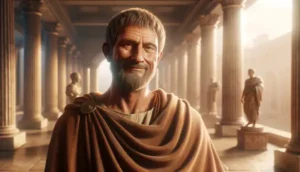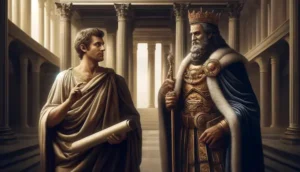In Seneca letter 65, “On the First Cause,” dives into the philosophical inquiries concerning the origins and workings of the universe, exploring various theories about causation and the nature of existence. Seneca shares with Lucilius his thoughts on the subject, drawing from different philosophical traditions to examine the principles that govern the universe and the role of divine providence in the cosmic order.
Seneca begins by recounting how he managed to find time for philosophical contemplation despite being unwell, indicating his dedication to intellectual pursuits: “I shared my time yesterday with ill health; it claimed for itself all the period before noon; in the afternoon, however, it yielded to me.” “I shared my time yesterday with ill health; it claimed for itself all the period before noon; in the afternoon, however, it yielded to me. “So conversation was substituted for writing; and from this conversation I shall communicate to you the topic which is still the subject of debate; for we have appointed you referee.”
Seneca discusses the Stoic view of causation, contrasting it with Aristotle’s and Plato’s more complex categorizations: “Our Stoic philosophers, as you know, declare that there are two things in the universe which are the source of everything – namely, cause and matter.” He elaborates on Aristotle’s four causes (material, efficient, formal, and final) and introduces Plato’s addition of the “fifth cause,” the idea or pattern, which guides the creation process: “To these four Plato adds a fifth cause – the pattern which he himself calls the ‘idea’; for it is this that the artist gazed upon when he created the work which he had decided to carry out.
"Our Stoic philosophers, as you know, declare that there are two things in the universe which are the source of everything – namely, cause and matter."
Seneca Tweet This Quote
Seneca appreciates the efforts of ancient philosophers to explain the universe, yet he acknowledges that their theories might not capture the full complexity of causation: “This throng of causes, defined by Aristotle and by Plato, embraces either too much or too little.” He argues for a simplified and more unified understanding of cause, centering on the divine or Creative Reason, which he equates with God: “Do we ask what cause is? It is surely Creative Reason, – in other words, God.”
"Do we ask what cause is? It is surely Creative Reason, – in other words, God."
Seneca Tweet This Quote
Seneca concludes by affirming the value of philosophical inquiry, not only as an intellectual exercise but as a means to achieve personal tranquility and freedom.
In Letter 65, Seneca navigates complex philosophical terrain to discuss the fundamental nature of reality, urging Lucilius to consider these deep questions as a way to enrich his understanding of the world and to find peace. This letter showcases the enduring human quest to grasp the origins and structure of the universe, highlighting philosophy’s role in providing clarity and solace
***** Letters from a Stoic Key Takeaways is a collection of short key takeaways from the letters sent by Seneca to Lucilius. Read each letter’s key takeways here .




